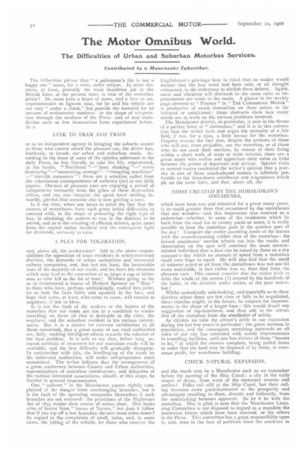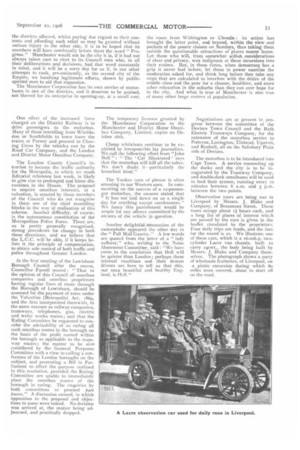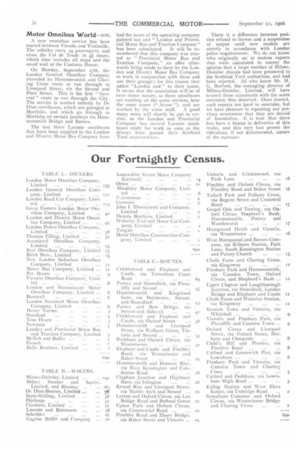The Motor Omnibus World.
Page 8

Page 9

Page 10

If you've noticed an error in this article please click here to report it so we can fix it.
The Difficulties of Urban and Suburban Motorbus Services.
Contributed by a Manchester Subscriber.
The Gilbertian phrase that " a policeman's life is not a happy one " must, for a time, sufter eclipse. In some districts, at least, probably the most thankless job in the British Isles, at the present time, is that of the motorbus driver 1 He must have a heart of stone, and a face as unimpressionable as lignitm vitce, for he and his vehicle are not only " under a cloud," but provide the material for an amount of midsummer madness in the shape of vituperation through the medium of the Press—and of oral malediction such as few innovations have experienced before. As
LINK TO TRAM AND TRAIN
or as an independent agency id bringing the suburbs nearer to those who cannot auord the pleasure car, the driver has, fearlessly, to invade our urban and suburban roads. According to the tenor of some of the epistles addressed to the daily Press, he has literally to lake his life, unprotected, in his hands. "Pestilence "—" bone shaking "—" nerve destroying"—"nauseating scourge"—"mangling machines" —" horrible nuisances " : these are a selection culled from the voluminous correspondence of sufferers (sic) in our daily papers. Owners of pleasure cars are enjoying a period of comparative immunity from the gibes of these destructive critics, ;.md one can imagine the speed lover smiling inwardly, gleeful that someone else is now getting a turn.
Is it not time, when one bears in mind the fact that the owners of motorbuses have such great initial difficulties to contend with, in the shape of procuring the right type of bus, in obtaining the powers to run in the districts to be served, and as to the securing of efficient drivers, quite apart from the capital outlay involved and the consequent light for dividends, seriously to raise A PLEA FOR TOLERATION,
and, above all, for moderation? Add to the above responsibilities the opposition of some residents in newly-traversed districts, the demands of urban authorities and interested railway companies, and, last but not least, the lamentable state of the majority of our roads, and we have the elements which may lead to the concoction of as large a cup of bitterness as ever fell to the lot of man! Without going so far as to recommend a course of Herbert Spencer on " Bias " to those who have, perhaps unthinkingly, rushed into print, let us look the facts fairly and squarely in the face, and hope that some, at Least, who came to curse, will remain to acquiesce, if not to bless.
It is not the fault of the makers or the buyers of the motorbus that our roads are not in a condition to render travelling on them all that is desirable to the rider, the wayfarer, and the suburban resident in his various conveyances: But it is a matter for extreme satisfaction to all those concerned, that a great many of our road authorities are, daily, making intelligent efforts towards the solution of the dust problem. It is safe to say that, before long, accepted methods of treatment for our macadam roads will be available, and the first difficulty will gradually disappear. In conjunction with this, the levelling-up of the roads by the interested authorities, will make self-propulsion more economical. The writer believes that the arrangement of a great conference between County and Urban authorities, representatives of motorbus constructors, and delegates of the various interested associations, should, at this stage, be fruitful in general improvements.
One " sufferer " in the Manchester papers rightly complained of the danger from overhanging branches, but it is the fault of the operating companies themselves if such branches are not removed : the provisions of the Highways Act of 1835 render their course of action clear. One hears cries of horror from " lovers of Nature," but does it follow that if you lop off a few branches the tree must come down? In regard to the complaints of smell, noise, and, in some cases, the jolting of the vehicle, let those who exercise the
Englishman's privilege bear in mind that no maker would declare that the last word had been said or all thought exhausted, in the endeavour to abolish these defects. Again, noise and vibration will diminish in the same ratio as improvements are made in the roads. A glance in the weekly page devoted to " Patents" in "THE Colossactas MOTOR" is productive of much instruction on these points to the initiated or uninitiated : those abstracts show how many minds are at work on the various problems involved.
The Manchester district, in particular, is now in the throes of a perfect fever of " antimobus," and it is in this connection that the writer feels and urges the necessity of a fair field, if not, for a time, a little favour for the motorbus. Enquiry reveals the fact that, despite the protests of those who will not, from prejudice, use the motorbus, or of those who do not need their services, by reason of their living within a short walk of tram or train termini, there are a great many who realise and appreciate their value as links between the points of departure and arrival. Special visits to several routes confirmed the writer's opinion that a journey in one of these much-abused motors is infinitely preferable to the three-horse omnibuses and wagonettes which ply on the same lines, and that, above all, the NOISE CREATED BY THE HORSE-DRAWN OMNIBUSES,
which have been run and tolerated for a great many years, is so much greater than that occasioned by the motorbuses that one wonders—and this impression was received as a pedestrian—whether, in some of the residences which lie back from the road ten to twenty yards or more, it is really possible to hear the motorbus pass in the quietest part of the day Compare the twelve pounding hoots of the horses with the smooth-running rubber tires of the motorbus : the horsed omnibuses' narrow wheels cut into the roads, and observation on the spot will convince the most narrowminded individual that a dust can be raised by them on a dry summer's day which no amount of speed from a motorbus could ever hope to excel. He will also find that the smell of unburnt petrol or oil from the motorbuses was not one bit more noticeable, in fact rather less so, than that (coin the pleasure cars. One cannot conceive that the critics wish to debit the whole of the aroma (?) created by the hundreds of the latter, in the districts under notice, to the poor motorbus !
Whilst undoubtedly safe-looking, and especially so in these districts where there are few rises or falls to be negotiated, these vehicles might, in the future, be subjects for improvements in the shape of a larger base : this would dispel any suggestion of top-heaviness, and thus add to the attraction of the motorbus from the standpoint of safety.
As citizens we take the citizen's pride in our expansion during the last few years in particular : the great increase in population, and the consequent stretching outwards on all sides of our city has coincided with steady improvements in travelling facilities, until one has visions of those "houses to let," of which the owners complain, being pulled down in order that the land may be disposed of by them, at enormous profit, for warehouse building.
CHECK NATURAL EXPANSION, and the result may be a Manchester such as we remember before the opening of the Ship Canal : a city in the early stages of decay, from want of the necessary sources and outlets ! Folks rail still at the Ship Canal, but their railing becomes more good-humoured as the prosperity and advantages resulting to them, directly and indirectly, from the undertaking becomes apparent. So let it be with the motorbus. One is glad to note that the Manchester Licensing Committee is not disposed to regard as a mandate the numerous letters which have been received, or the others in the Press. This committee has a great responsibility upon it, and, even in the face of petitions from the residents in
the districts affected, whilst paying due regard to their contents and affording such relief as may be granted without serious injury to the other side, it is to be hoped that its members will have continually before them the word " Progress." Manchester would not be the city it is, if it had not always taken care to elect to its Council men who, in all their deliberations and decisions, had that word constantly in mind, and it will be a sorry day for us if, in our other attempts to rank, pre-eminently, as the second city of the Empire, we handicap legitimate efforts, shown by publicspirited men to aid that expansion.
The Manchester Corporation has its own service of motorbuses in one of the districts, and it deserves to be praised, not blamed for its enterprise in opening-up, at a small cost, the route from Withington to Cheadle : its action has brought the latter point, and beyond, within the view and pockets of the poorer classes on Sundays, thus taking them outside the questionable attractions of places nearer home. Let those who will, from somewhat selfish considerations of class and privacy, wax indignant at these incursions into their realms. But, in these times, when democracy has a grip it never had before, let those in power exercise the moderation asked for, and think long before they take any steps that are calculated to interfere with the desire of the middle class and the poor for a cleaner, healthier, and more sober relaxation in the suburbs than they can ever hope for in the city. And what is true of Manchester is also true of many other large centres of population.
One effect of the increased fares charged on the District Railway is to drive passengers to the motorbus. Many of those travelling from Wimbledon or Southfields to town leave the trains at Putney and proceed to Charing Cross by the vehicles run by the Road Car Company, and the London and District Motor Omnibus Company.
The London County Council's intention to become the traffic authority Losthe Metropolis, to which we made Editorial reference last week, is likely to give rise to prolonged and bitter discussions in the House. The proposal to acquire omnibus interests, at a valuation, is scouted by those members of the Council who do not recognise in them one of the chief stumbling blocks in the way of realisation of this scheme. Another difficulty, of course, is the autonomous constitution of the Metropolitan Police Force. There are, as is pretty generally recognised, strong precedents for change in both these directions, and we believe that the L.C.C. will be able, if it keeps before it the principle of compensation, to obtain sole control of both traffic and police throughout Greater London.
At the first meeting of the Lewisham Borough Council after the recess, Councillor Farrell moved : "That in the opinion of this Council all omnibus companies and omnibus proprietors having regular lines of route through the Borough of Lewisham, should be assessed for the payment of rates under the Valuation (Metropolis) Act, 1869, and the Acts incorporated therewith, in the same manner as railway companies, tramways, telephones, gas, electric and water works mains ; and that the Rating Committee be requested to consider the advisability of so rating all such omnibus routes in the borough on the basis of the profit earned within the borough as applicable to the tramway routes ; the matter to be also considered by the General Purposes Committee with a view to calling a conference of the London boroughs on the subject, and promoting a Bill in Parliament to effect the purpose outlined in this resolution, provided the Rating Committee are unable to immediately place the omnibus routes of the borough in rating. The enquiries by both committees to proceed pani passu." A discussion ensued, in which opposition to thc proposal and objections to same were voiced. No decision was arrived at, the matter being adjourned, and practically dropped.
The temporary licenses granted by the Manchester Corporation to the Manchester and District Motor Omnibus Company, Limited, expire on October 16th.
Cheap witticisms continue to be exploited by irresponsible lay journalists. 1Ve cull the following effort from "John Bull " : " The Car Illustrated ' says that the motorbus will kill all the tubes. We don't doubt it—particularly the bronchial kind."
The Yankee turn of phrase is often amusing to our Western ears. In commenting on the success of a 12-passenger motorbus, the owners stated that It has not laid down on us a single day for anything except carelessness." We fancy this punishment would be ample for any offence committed by the owners of the vehicle in question.
Another delightful emanation of the motorphobe appeared the other day in the" Pall Mall Gazette." A few words are quoted from the letter of a " lady sufferer," who, writihg to the Noise Abatement Committee, said : "We have come to the conclusion that Hell will be quieter than London; perhaps these infernal machines and their demon drivers are here to tell us that this, our once beautiful and healthy England, is Hell." Negotiations are at present in progress between the committee of the Devizes Town Council and the Bath Electric Tramways Company, for the extension of the tnotorbus service to Potterne, Lavington, Tilshead, Upavon, and Rushall, all on the Salisbury Plain side of Devizes.
The motorbus is to be introduced into Cape Town. A service connecting up the docks and the city is to be inaugurated by the Tramway Company, and double-deck omnibuses will be used to feed their system, running every to minutes between 8 a.m. and 5 p.m. between the two points.
Observation tours are being run in Liverpool by Messrs. J. Blake and Company, of Beaumont Street. These tours occupy about it hours each, and a long list of places of interest which are passed by the cars is given in the leaflet circulated by the proprietors. Four daily trips are made, and the fare for the round is 2s. We illustrate one of these cars, which is a 16-2oh.p. twocylinder Lacre van chassis, built to carry 24cwt., the body being built by Messrs. J. Blake and Company themselves. The photograph shows a party of wholesale fruiterers, of Liverpool, on a picnic excursion during which 8o miles were covered, about to start off on the road.
A new motorbus service has been started between Vievola and Vintimille. The vehicles carry 24 passengers, and cross the Col de Tende in 41 hours, which time includes all stops and the usual wait at the Customs House.
On Monday, September 17th, the London General Omnibus Company extended its I lammeramith and Charing Cross route to run through to Liverpool Street, via the Strand and Fleet Street. This is the first " General " route to run through the City. The service is worked entirely by De Dion omnibuses, which are garaged at Mortlake, and which go through to Mortlake on certain journeys via Hammersmith Bridge and Barnes.
The last three Lacoste omnibuses that have been supplied to the London and District Motor Bus Company have had the name of the operating company painted out and "London and Provincial Motor Bus and Traction Company"
has been substituted. It will be remembered that this company was started as " Provincial Motor Bus and Traction Company," an offer afterwards being made to them by the London and District Motor Bus Company to work in conjunction with them and use their garage ; for this reason they added "London and" to their name. It seems that the association will be of even closer nature, as these omnibuses are running on the same services, bear the same name (" Arrow "), and are worked by the same staff. A good many more will shortly be put in service, as the London and Provincial Company has several Lacoste omnibuses ready for work as soon as the drivers have passed their Scotland Yard eV!' pinntions, There is a difference between positive refusal to license and a suspension of output until new models are strictly in accordance with London police requirements. We do not know who originally set in motion reports that were caiculated to convey the opinion that a large number of MilnesDaimler chassis had been presented to the Scotland Yard authorities, and had been rejected. All who know Mr. H. G. Burford, the managing director of Milnes-Daimler, Limited, will have treated these statements with the scant ceremony they deserved. Once started, such reports are hard to overtake, but we have pleasure in repeating our previous assurances that they are devoid of foundation. It is true that there has been a hiatus in deliveries of this make, and this very fact proves the ridiculous, if not disinterested, nature of the rumours.
























